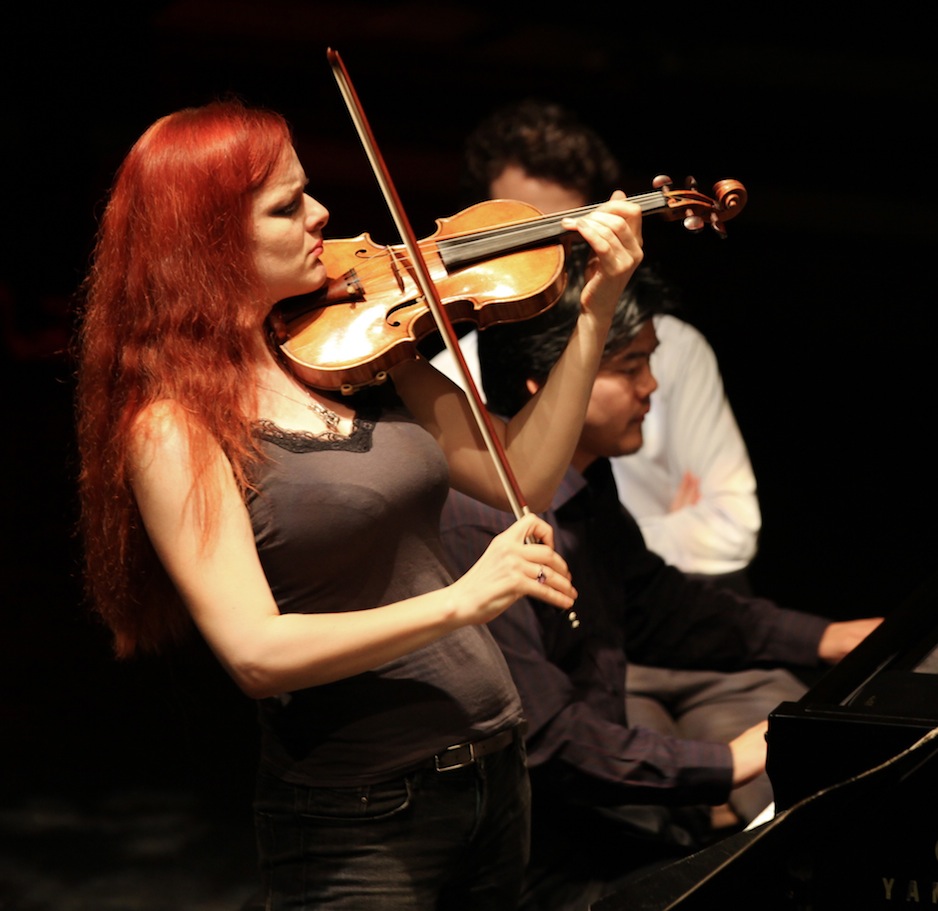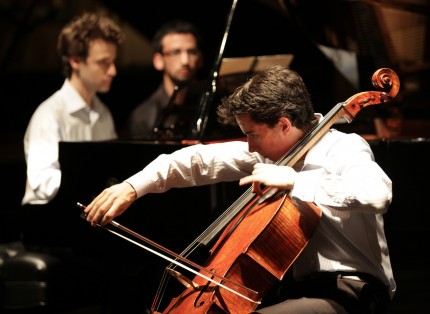Beethoven Festival serves up a remarkable ten-hour feast

Imagine a music festival where just one day’s events wind up running four hours longer than Parsifal.
Such was Wednesday’s installment of the Beethoven Festival in Uptown. Brainchild of the indefatigable pianist George Lepauw, the midpoint of this nine-day series presented an almost unbroken ten-hour marathon serving up repertoire from Bach to Ysaye.
I did the full immersion from Stéphane Tétreault’s performance of Bach’s Cello Suite No. 1 in G major at 3 p.m. to various encores and a final Q&A at 12:45 a.m. Thursday morning.
Needless to say, nearly ten hours of continuous music is not for everybody. But Lepauw’s festival, now in its second year, truly is a unique and unprecedented event in Chicago. Even with the inevitable program changes and on-the-fly reshuffling, Wednesday’s events found a nice organic flow with a dizzying variety of repertoire and consistently high level of performance. Keeping this moveable musical feast on track is a daunting task. Yet, in addition to being a prodigiously gifted pianist, Lepauw proved a personable and engaging host with his introductions and brief interviews with musicians setting an inviting air of relaxed informality.
It’s unfortunate that throughout Wednesday’s ten musical hours, the audience never rose above thirty or so people—and that included two critics, relatives and festival-related personnel. Surely a city like Chicago can provide greater support for a music festival of such scope and audacity.
Is it fear of the neighborhood? The stretch of Lawrence Avenue in Uptown is a bit scruffy to be sure but remains safe with plenty of parking and potential concertgoers should not hesitate on that score.
The unorthodox venue is the former People’s Church, now renamed the National Pastime Theater (is a baseball museum planned?). The fourth floor auditorium has a decayed grandeur about it but proved a fine room acoustically, able to handle a variety of the day’s events from solo cello to voice and electronics. Less grateful was the temperature inside with the noisy fans shut off for the performances, which made things a bit warm for artists and audience alike.
The visual element is a key component of the festival’s theme, “Revolution 2012.” Several young artists’ creations are displayed on the walls, the idea being to “embody Beethoven’s revolutionary spirit,” says festival curator Catinca Tabacaru. Throughout the day and during Wednesday’s performances, painter Justin Steimer worked on a high mural to the left of the stage, and it was a rare and fascinating genre-crossing experience to see his painting progress as the performances unfolded.
Along with several of Chicago’s top musicians and ensembles, Lepauw has corralled a number of Europe-based colleagues. Most of these young musicians are unknown stateside but many are destined to have major careers.
Stéphane Tétreault opened the musical events with Bach’s First Cello Suite. The 19-year-old Canadian had a couple passing digital slips but was otherwise highly polished, gracefully pointing the rhythms of the dance movements, and bringing spacious feeling and depth of expression to the meditative Sarabande. His performance was clearly not hurt by playing the 1707 “Countess of Stainlein, Ex-Paganini,” Stradivarius, a magnificent instrument that, Lepauw pointed out, predated Bach’s composition of the suites.
The informal festival ambiance with its close-up proximity of the performers makes for unique moments. When Soheil Nasseri came out with four small squares to raise the piano bench, a question from an audience member about the risers led to an interesting disquisition by the pianist on his little squares. Nasseri has two sets and has to make them light so they don’t count as extra baggage weight when he travels.
Born in California and resident in Berlin, Nasseri offered Beethoven’s op. 119 Bagatelles. The playing could have used more dynamic variety and the wit wasn’t always as sharply conveyed in these miniatures as one might like, but Nasseri brought out the quirky qualities and rhythmic curveballs effectively.
In the first of her two appearances Wednesday, Rachel Kolly d’Alba performed Guillaume Lekeu’s Violin Sonata with pianist Winston Choi. It’s an appealing, richly melodic work that deserves to be better known, even if the influence of Lekeu’s teacher Cesar Franck is manifest in its Late Romantic style and surging melodies, and the sonata just misses that last bit of individual distinction.
The magenta-haired Swiss violinist—hiply clad in black jeans and sleeveless t-shirt—certainly gave it her all. A few fleeting moments of wayward pitch apart, d’Alba conveyed the rhapsodic, soaring melodies in an impassioned performance, with a sweetly lyrical account of the slow movement. Choi’s equally ardent keyboard work was with her every step of the way.
Pianist James Rhodes was meant to be a short addition to the afternoon, but Lepauw had difficulty getting the loquacious British pianist off stage. A media celebrity in his native England, Rhodes is being heavily promoted as a kind of musically gifted savant who taught himself piano, a less deranged version of David Helfgott. (Rhodes said he quit playing for ten years due to his parents’ lack of support for a music career.) His shtick Wednesday playing music in the style of Beethoven is nothing new, though the hyperactive, fast-talking Rhodes clearly has a blockbuster technique. He is playing a full recital Thursday and it will be interesting to see if he can rise above the messianic and predictable hype (wunderkind rock musician livens up the “boring” classical world) of his record company and promoters.
Kudos to Lepauw for paying homage to the centennial of John Cage, which has so far gone somewhat under observed in Chicago. The late afternoon session led off with a superb performance of Conlon Nancarrow’s Two Canons for Ursula, with pianist Choi bringing out the asymmetric symmetry and broken-note bravura.
Julia Bentley is one of our finest and most versatile contemporary music advocates and the mezzo-soprano showed her wide-ranging skills in Cage’s Aria. Performed along with projections and an electronic realization of Cage’s Fontana Mix, Bentley assayed the whoops, snarls, laughs and vocal acrobatics with all the explosive virtuosity of the work’s dedicatee, Cathy Berberian. In Cage’s early Five Songs on ee cummings, Bentley put across the charmingly off-kilter settings (and neatly nailed the inspiration in her introduction when she noted their debt to Virgil Thomson). The singer was a triple threat in Cage’s Four Dances as vocalist, percussionist and pianist, aiding Kuang Hao-Huang by playing the strings of the prepared instrument. (The musicians rehearsing audibly next door added yet another aleatoric layer.)
Charles Rosen cancelled his evening recital due to illness, and the slot was filled instead by Beethoven’s Clarinet Trio. Cellist Christopher Ferrer’s intonation was not always airtight, but Lepauw and clarinetist Cory Tiffin were wholly inside the music, with Tiffin especially inspired in a rapt slow moment and with buoyant playing throughout.
After a dinner break, violinist d’Alba (now changed into formal concert gown) returned for nothing less than Eugene Ysaye’s complete Sonatas for solo violin. These almost comically difficult works are a virtual compendium of technical landmines and ludicrous complexities.
Performing one or two would be impressive but tackling all six back to back in a live performance is truly an astounding feat, not least in a warm and humid venue. The perspiration made for some brief slips in the final sonatas, but for the most part d’Alba sailed through the myriad challenges with remarkable fire, intensity and fiddle technique to burn.

Wednesday’s marathon closed with Lepauw and cellist Tétreault. Shostakovich’s Cello Sonata is night music if there ever was, and received the most combustible performance of the evening with remarkable powerful playing from both men.
An arrangement of the Adagio from Prokofiev’s Cinderella ballet was supposed to close the evening and would have served as a fine coda. But Lepauw asked the visibly spent Tétreault to encore the Bach Cello Suite he had played eight hours earlier–not a movement, but the entire suite. To his credit, the gracious young Canadian did not poke Lepauw in the eye with his bow but performed the Bach once again, with burnished tone and even deeper feeling than earlier in the day.
It was approaching midnight but the evening was not yet over. Lepauw and Tétreault came back out for a glowing arrangement of Massenet’s Meditation and an elegant rendering of Saint-Saens’ The Swan. Following some more Q&A and history about Tétreault’s instrument, Lepauw called it a wrap at a quarter to one.
The Beethoven Festival really is worth checking out, and day passes allow the curious to stay as long as they like for as many performances as they can handle. The quality is high and the programming daring and eclectic. Do try to catch some of the ongoing events.
The Beethoven Festival runs through Sunday. lvbfest.com
Posted in Performances



Posted Sep 14, 2012 at 11:14 am by jizungu
A way cool event, shouldn’t be missed. I caught some of Thurs night’s offerings. I thought Rhodes’s playing lacked nuance (the wrong notes didn’t bother me), and was not charmed by his studied-casual shtick. Of the gigs I caught, the finest playing was by Kolly d’Alba and Gabriele Baldocci, whose revelatory performance of the Busoni 2nd violin sonata was a marvel of subtlety and spontaneity: they sounded as if the music was being spun out on the spot. I couldn’t last thru all of the midnight Bach session (not as young as I used to be), but some of it was quite fine, especially a spirited 5th Brandenburg. BTW the venue is great and the neighborhood should deter no-one. (Studs Terkel chose to live there.) It’s convenient & fascinating & funky, and there are lots good eateries nearby where concertgoers can take a break.
Posted Sep 14, 2012 at 9:23 pm by Michael Scott
I would say that, in defense of James Rhodes whose recordings are really quite wonderful, that the festival organizers did him no good by putting him on so late Thursday night. It was something like 0300 GMT when he started … and that’s after arriving, jet-lagged he said.
Regardless, he managed to pull me into the music, convincingly persuading me that there was more to the pieces he played than one normally hears.
To each his own, I guess, but I hope to hear more from this guy.
The comparison to Helfgott was IMHO a pretty cheap shot. There is NO comparison. None whatsoever.